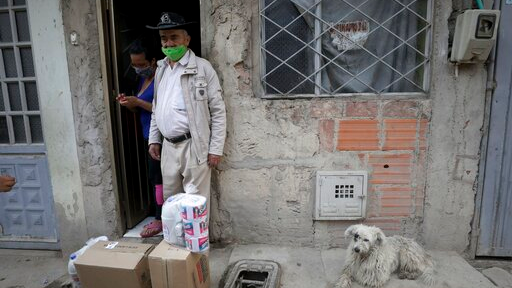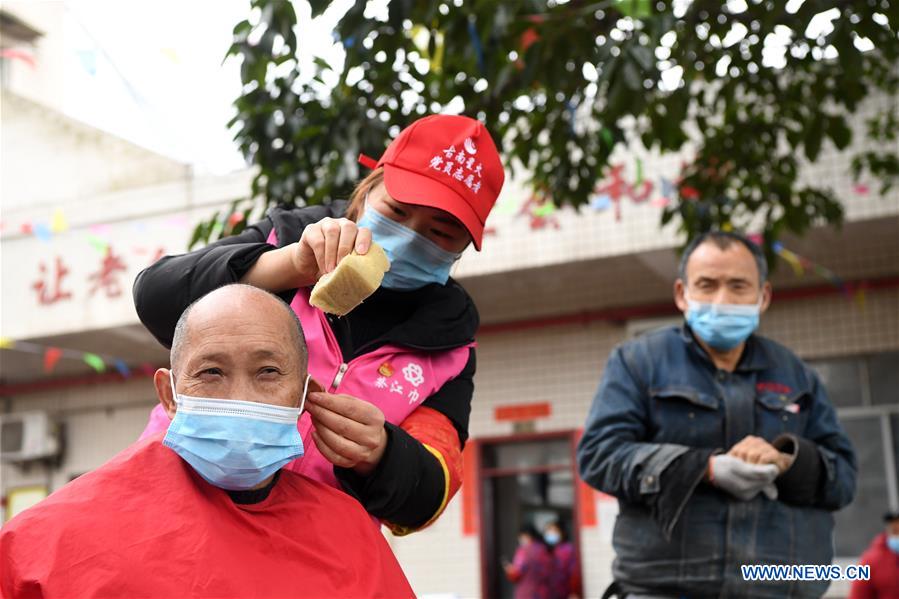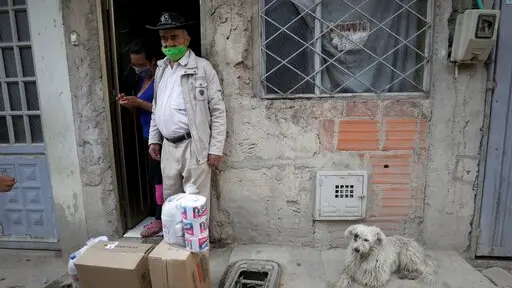
An elderly couple stand outside their home with free food delivered by the city government, in Bogota, Colombia, June 12, 2020. /AP
Editor's note: Stephen Ndegwa is a Nairobi-based communication expert, lecturer-scholar at the United States International University-Africa, author and international affairs columnist. The article reflects the author's opinions and not necessarily the views of CGTN.
One of the grim warnings after the declaration of the new coronavirus global pandemic early this year referred to the categories of people most at risk of getting infected. In addition to COVID-19 easily overwhelming people with grave pre-existing medical conditions like cancer, heart disease, diabetes and asthma, everyone over 60 years old was advised to self-quarantine.
According to the U.S. Centers for Disease Control and Prevention (CDC), older adults are a high-risk group in the contagion. CDC statistics show that eight out of 10 deaths from coronavirus reported in the U.S. have been in adults aged 65 years old and over.
In a statement on April 2, the World Health Organization regional office for Europe said findings had shown that over 95 percent of coronavirus-related deaths had occurred in those older than 60 years, with 50 percent of all deaths recorded being of people aged 80 years or older.
"Some of the reasons older people are greatly impacted by COVID-19 include the physiological changes associated with ageing, decreased immune function and multi-morbidity, which expose older adults to be more susceptible to the infection itself and make them more likely to suffer severely from COVID-19 disease and more serious complications."
In order to reduce the risk of infection, medical experts advice that elders should, among other measures, practice more social and physical distancing, postpone unnecessary doctor visits, and avoid non-essential travel.
Now, while scientists in the University of East Anglia in Britain also claimed that face masks are of little protective benefit to the general population, or those who are otherwise healthy, they stressed that "elderly and vulnerable people should wear face masks on public transport, to the shops and in hospitals and care homes to stop themselves from catching coronavirus."
This presupposes that the elderly, usually categorized as those who are 65 years and older, are automatically vulnerable. Although the above depicts a medical and health crisis, it is also a perfect scenario of the vulnerability of the elderly in today's world. As times change, the old among us are becoming increasingly ignored, and seen as a burden in the ever changing scheme of things.
It is the same case in Asia and Africa, places where the elderly were usually revered, if for nothing else, for their advanced age. But this was during the time of the extended family, where resources were pooled and the burden of care was spread out. With the tough economic times, many governments now budget for the elderly only after allocating money for more pressing or "important" programs.

A volunteer cuts hair for an elderly man at an elderly care center in Chongqing, southwest China, March 5, 2020. /Xinhua
Celebrated every year on June 15, the United Nations World Elder Abuse Awareness Day seeks to raise awareness of the abuse and suffering increasingly experienced by the world's older generations. According to World Health Organization (WHO) estimates, one in six people aged over 60 suffer abuse, amounting to almost 141 million people globally.
The WHO defines elder abuse as "a single, or repeated act, or lack of appropriate action, occurring within any relationship where there is an expectation of trust which causes harm or distress to an older person." It is a global social issue which affects the health and human rights of millions of older persons, and an issue which deserves the attention of the international community.
Old people are a crucial part of any society. They are the custodians of the society's institutional memory, holding invaluable knowledge of the evolution of populations through past generations. Harnessed properly, the elderly could contribute enormously in the search for a coronavirus cure, through their experience with previous disease outbreaks.
It is true that the elderly are vulnerable in fundamental ways. As the best days of their productivity are behind them, they remain exposed in several ways, especially physically, psychologically, emotionally and financially.
The Nursing Home Abuse Center in the U.S. lists the seven main types of elder abuse as physical, sexual, emotional or psychological, neglect, abandonment, financial, and self-neglect. Since the elderly do not have a strong voice, most of these forms of abuse go unnoticed or are not addressed with the gravity they deserve.
As the world focuses more on the economic ravages of the coronavirus pandemic, abuse against the elderly is generally bound to worsen. Therefore, it is important that those involved in taking care of the needs of the elderly become more aware of the gaps, and ensure they come up with strategies that will stop any escalation of the status quo by taking both remedial and improvement action where necessary.
Indeed, abuse of the elderly is a human rights issue that has devastating consequences. Legal sanctions must be enacted against those who deliberately injure this weak demographic group. Governments need to come up with social safety nets for the elderly as a key constituent in COVID-19 mitigation measures.
(If you want to contribute and have specific expertise, please contact us at [email protected])
 简体中文
简体中文

